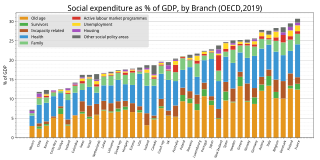Related Research Articles

A political party is an organization that coordinates candidates to compete in a particular country's elections. It is common for the members of a party to hold similar ideas about politics, and parties may promote specific ideological or policy goals.
Political science is the scientific study of politics. It is a social science dealing with systems of governance and power, and the analysis of political activities, political thought, political behavior, and associated constitutions and laws.
Autocracy is a system of government in which absolute power is held by the ruler, known as an autocrat. It includes most forms of monarchy and dictatorship, while it is contrasted with democracy and feudalism. Various definitions of autocracy exist. They may restrict autocracy to cases where power is held by a single individual, or they may define autocracy in a way that includes a group of rulers who wield absolute power. The autocrat has total control over the exercise of civil liberties within the autocracy, choosing under what circumstances they may be exercised, if at all. Governments may also blend elements of autocracy and democracy, forming an anocracy. The concept of autocracy has been recognized in political philosophy since ancient times.
Accountability, in terms of ethics and governance, is equated with answerability, culpability, liability, and the expectation of account-giving.

A welfare state is a form of government in which the state protects and promotes the economic and social well-being of its citizens, based upon the principles of equal opportunity, equitable distribution of wealth, and public responsibility for citizens unable to avail themselves of the minimal provisions for a good life.
In political science, a political system means the type of political organization that can be recognized, observed or otherwise declared by a state.

Democratization, or democratisation, is the structural government transition from an authoritarian government to a more democratic political regime, including substantive political changes moving in a democratic direction.
The resource curse, also known as the paradox of plenty or the poverty paradox, is the phenomenon of countries with an abundance of natural resources having less economic growth, less democracy, or worse development outcomes than countries with fewer natural resources. There are many theories and much academic debate about the reasons for and exceptions to the adverse outcomes. Most experts believe the resource curse is not universal or inevitable but affects certain types of countries or regions under certain conditions.
Avner Greif is an economics professor at Stanford University, Stanford, California. He holds a chaired professorship as Bowman Family Professor in the Humanities and Sciences.

Margaret Levi is an American political scientist and author, noted for her work in comparative political economy, labor politics, and democratic theory, notably on the origins and effects of trustworthy government.

A democratic transition describes a phase in a countries political system as a result of an ongoing change from an authoritarian regime to a democratic one. The process is known as democratisation, political changes moving in a democratic direction. Democratization waves have been linked to sudden shifts in the distribution of power among the great powers, which created openings and incentives to introduce sweeping domestic reforms. Although transitional regimes experience more civil unrest, they may be considered stable in a transitional phase for decades at a time. Since the end of the Cold War transitional regimes have become the most common form of government. Scholarly analysis of the decorative nature of democratic institutions concludes that the opposite democratic backsliding (autocratization), a transition to authoritarianism is the most prevalent basis of modern hybrid regimes.
Authoritarianism is a political system characterized by the rejection of democracy and political plurality. It involves the use of strong central power to preserve the political status quo, and reductions in the rule of law, separation of powers, and democratic voting. Political scientists have created many typologies describing variations of authoritarian forms of government. Authoritarian regimes may be either autocratic or oligarchic and may be based upon the rule of a party or the military. States that have a blurred boundary between democracy and authoritarianism have some times been characterized as "hybrid democracies", "hybrid regimes" or "competitive authoritarian" states.

Jennifer L. Lawless serves as the Commonwealth Professor of Politics of the University of Virginia and a faculty affiliate of the Frank Batten School of Leadership and Public Policy, in addition to being a Non-Resident Senior Fellow in Governance Studies at the Brookings Institution.
A hybrid regime is a type of political system often created as a result of an incomplete democratic transition from an authoritarian regime to a democratic one. Hybrid regimes are categorized as having a combination of autocratic features with democratic ones and can simultaneously hold political repressions and regular elections. Hybrid regimes are commonly found in developing countries with abundant natural resources such as petro-states. Although these regimes experience civil unrest, they may be relatively stable and tenacious for decades at a time. There has been a rise in hybrid regimes since the end of the Cold War.
Ryan Maness is an American cybersecurity expert and an assistant professor at the Defense Analysis Department of Naval Postgraduate School. He is the co-author of Cyber War Versus Cyber Realities: Cyber Conflict in the International System, which won widespread critical acclaim.
Michael Andrew Jones-Correa is President's Distinguished Professor of political science at the University of Pennsylvania. His research centers on the topics of immigrant political incorporation and ethnic and racial relations in the United States, often writing about political behavior in the context of institutional structures.

Lawrence R. Jacobs is an American political scientist and founder and director of the Center for the Study of Politics and Governance (CSPG) at the University of Minnesota. He was appointed the Walter F. and Joan Mondale Chair for Political Studies at the University of Minnesota's Humphrey School of Public Affairs in 2005 and holds the McKnight Presidential Chair. Jacobs has written or edited, alone or collaboratively, 17 books and over 100 scholarly articles in addition to numerous reports and media essays on American democracy, national and Minnesota elections, political communications, health care reform, and economic inequality. His latest book is Democracy Under Fire: Donald Trump and the Breaking of American History. In 2020, he was elected a Fellow of the American Academy of Arts and Sciences.
Andreas Wimmer is a Swiss sociologist who is the Lieber Professor of Sociology and Political Philosophy at Columbia University. He has a PhD in social anthropology from the University of Zurich.
Rational choice is a prominent framework in international relations scholarship. Rational choice is not a substantive theory of international politics, but rather a methodological approach that focuses on certain types of social explanation for phenomena. In that sense, it is similar to constructivism, and differs from liberalism and realism, which are substantive theories of world politics. Rationalist analyses have been used to substantiate realist theories, as well as liberal theories of international relations.
Premilla Nadasen is an activist and historian, who specialises in the histories of women of colour in the welfare rights movement. She was President of the National Women's Studies Association from 2018 to 2020. She is the author of Welfare Warriors: The Welfare Rights Movement in the United States (2005) and Household Workers Unite: The Untold Story of African American Women Who Built a Movement (2016).
References
- 1 2 "Jennifer Pan | Political Science". politicalscience.stanford.edu. Retrieved March 8, 2023.
- 1 2 "Jennifer Pan's Profile". Stanford Profiles. Retrieved May 24, 2023.
- ↑ Radney, Imani (June 30, 2021). ""They Don't See Their Work as Surveillance": Jennifer Pan on Chinese Welfare and Society". Public Books. Retrieved March 8, 2023.
- ↑ Pan, Jennifer (June 25, 2020). Welfare for Autocrats: How Social Assistance in China Cares for its Rulers. doi:10.1093/oso/9780190087425.001.0001. ISBN 978-0-19-008742-5 . Retrieved March 8, 2023.
- ↑ Solinger, Dorothy J. (December 2020). "Jennifer Pan, Welfare for Autocrats: How Social Assistance in China Cares for its Rulers: (New York: Oxford University Press, 2020), 225p. $99.00 hardback; $29.95 paperback". Journal of Chinese Political Science. 25 (4): 685–687. doi:10.1007/s11366-020-09678-4. ISSN 1080-6954. S2CID 225600051.
- ↑ Vortherms, Samantha A. (January 1, 2022). "Welfare for Autocrats: How Social Assistance in China Cares for Its Rulers , by Jennifer Pan. New York: Oxford University Press, 2020. vii+225 pp. £64.00 (cloth), £19.99/US$29.95 (paper); also available as an e-book". The China Journal. 87: 119–120. doi:10.1086/716976. ISSN 1324-9347. S2CID 246793231.
- ↑ Elfstrom, Manfred (December 2021). "Welfare for Autocrats: How Social Assistance in China Cares for its Rulers. By Jennifer Pan. New York: Oxford University Press, 2020. 248p. $99.00 cloth, $29.95 paper". Perspectives on Politics. 19 (4): 1277–1278. doi:10.1017/S1537592721003200. ISSN 1537-5927. S2CID 245026340.
- ↑ Cousins, Mel (July 2022). "Welfare for Autocrats: How Social Assistance in China Cares for its Rulers By Jennifer Pan. New York: Oxford University Press, 2020. 288 pp., £64 (cloth) £19.99 (paper)". Journal of East Asian Studies. 22 (2): 357–358. doi:10.1017/jea.2022.6. ISSN 1598-2408. S2CID 246799251.
- ↑ Hammond, Daniel R. (March 2022). "Welfare for Autocrats: How Social Assistance in China Cares for its Rulers Jennifer Pan Oxford: Oxford University Press, 2020 225 pp. £19.99; $29.95 ISBN 978-0-1900-8743-2". The China Quarterly. 249: 279–280. doi:10.1017/S0305741022000133. ISSN 0305-7410. S2CID 247372274.